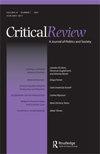认真对待自由:康德伦理学与康德伦理学
IF 1.7
3区 社会学
Q4 POLITICAL SCIENCE
引用次数: 0
摘要
在学院派哲学家中,没有比康德的道德理解更有热情和影响力的捍卫者了。然而,正如迈克尔·罗森在《上帝的影子》中所论证的那样,在某种意义上,康德的批评者如今比他的捍卫者更认真地对待他的自由概念。因此,当代版本的“康德伦理学”常常以挑战罗森所说的“康德伦理学”而告终,而不仅仅是挑战与之竞争的道德理论的主张。罗森用一些有力的论据来支持这个令人惊讶的结论,表明如果我们将康德的道德哲学与康德的先验自由概念分离开来,我们就无法理解康德的道德哲学及其对现代哲学的非凡影响。但是罗森夸大了康德和他所启发的唯心主义哲学家之间的连续性。像席勒、谢林和黑格尔这样的思想家,对康德的先验自由概念的重视程度远远超过了今天康德伦理学的捍卫者。但正是因为他们这样做,他们觉得有必要解决一系列全新的问题,这些问题只能通过彻底改变他们从康德那里得到的自由概念来解决。关键词:黑格尔·康德迈克尔·罗森异化道德哲学先验自由注1对康德赋予像我们这样自由的人的崇高状态并没有充满敬畏,这个形象在伍德心中所激发的“唯一的道德情感”是“愤怒——任何人都可以认为超自然主义的迷信是道德体面的必要条件”(伍德引文2008,138;引用于Rosen Citation2022, 106)正如罗森(Citation2022, 232)恰当地评论的那样,康德永远不会接受像席勒这样的论点,因为对康德来说,“道德……实际上是违背自然规律的。我在我的书《对全面革命的渴望》(Citation1986 [Citation1992],伯克利)中阐述了德国人对康德的反应。请特别参阅第3章“康德左派的社会不满”,以及我在《Yack Citation2021》(“重新审视对全面革命的渴望”)中简要概述的论点然而,在某一点上,罗森(Citation2022, 67)改变了这个比喻,将康德的上帝描述为一个“开明的暴君”,而不是一个立宪君主,我认为这削弱了他的观点我应该指出,我目前正在完成一本书,为道德多元主义进行非常非康德式的辩护,书名暂定为《道德多元主义的面孔:来自欧洲文学的五幅肖像》。本文章由计算机程序翻译,如有差异,请以英文原文为准。
Taking Freedom Seriously: Kantian Ethics Versus the Ethics of Kant
ABSTRACTNo understanding of morality has more zealous or influential defenders among academic philosophers than Kant’s. Yet as Michael Rosen demonstrates in The Shadow of God, there is a sense in which Kant’s critics take his conception of freedom more seriously nowadays than his defenders. As a result, contemporary versions of “Kantian ethics” often end up challenging what Rosen calls “the ethics of Kant,” not just the claims of rival moral theories. Rosen supports this surprising conclusion with some powerful arguments, showing that we cannot make sense of Kantian moral philosophy or its extraordinary impact on modern philosophy while detaching it from Kant’s conception of transcendental freedom. But Rosen overstates the continuity between Kant and the Idealist philosophers that he inspired. Thinkers like Schiller, Schelling, and Hegel took Kant’s concept of transcendental freedom far more seriously than defenders of Kantian ethics do today. But precisely because they did so, they felt compelled to address a whole new set of problems, which could be solved only by radically transforming the conception of freedom that they received from Kant.Keywords: HegelKantMichael Rosenalienationmoralityphilosophy of historytranscendental freedom Notes1 Far from being filled with awe at the exalted condition that Kant attributes to freed beings like ourselves, “the only moral emotion” that this image inspires in Wood’s breast “is outrage—that anyone could think supernaturalist superstition a necessary condition for moral decency” (Wood Citation2008, 138; quoted in Rosen Citation2022, 106).2 As Rosen (Citation2022, 232) aptly comments, Kant could never accept an argument like Schiller’s because, for Kant, “morality . . . actually works against nature.”3 I develop this account of the German reaction to Kant in my book The Longing for Total Revolution (Citation1986 [Citation1992], Berkeley). See, in particular, ch. 3, “The Social Discontent of the Kantian Left,” as well the brief outline of my arguments in Yack Citation2021 (“Revisiting The Longing for Total Revolution”).4 At one point, however, Rosen (Citation2022, 67) alters the metaphor, describing Kant’s God as an “enlightened despot,” rather than a constitutional monarch, which, I believe, weakens his point.5 I should probably note that I am currently completing a very un-Kantian defense of moral pluralism in a book, tentatively titled: The Faces of Moral Pluralism: Five Portraits from European Literature.
求助全文
通过发布文献求助,成功后即可免费获取论文全文。
去求助
来源期刊

Critical Review
POLITICAL SCIENCE-
CiteScore
1.30
自引率
12.50%
发文量
17
期刊介绍:
Critical Review: A Journal of Politics and Society is a political-science journal dedicated to advancing political theory with an epistemological bent. Recurrent questions discussed in our pages include: How can political actors know what they need to know to effect positive social change? What are the sources of political actors’ beliefs? Are these sources reliable? Critical Review is the only journal in which the ideational determinants of political behavior are investigated empirically as well as being assessed for their normative implications. Thus, while normative political theorists are the main contributors to Critical Review, we also publish scholarship on the realities of public opinion, the media, technocratic decision making, ideological reasoning, and other empirical phenomena.
 求助内容:
求助内容: 应助结果提醒方式:
应助结果提醒方式:


